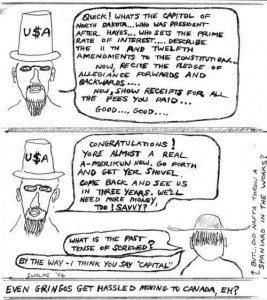Column by George Sibley
Retirement – June 2006 – Colorado Central Magazine
BY THE TIME YOU READ THIS, I will have crossed another of those thresholds that we Americans have made sacred in a secular kind of a way. Or maybe we’ve secularized something once sacred. Whichever it is, since my last column I’ve turned 65.
For the nearly two-thirds of a century I’ve been around, 65 has been a kind of life benchmark, the other end of a process that began for me when I turned 14, the legal age for getting a job in Pennsylvania. I remember going with my mother and my birth certificate to get my number at the Social Security office.
Why 14 as the age when a kid could officially join the workforce (and leave mandatory public schooling)? I realize that this general age has been somewhat sacred for many human societies as a transition time. Ancient peoples around the world send their 13- or14-year-olds out for a vision quest to learn who they really are, or bring them into the kiva, the temple or other sacred space to admit them into the adult world.
So in an industrial culture, where we are conditioned from an early age to regard “work” as sort of holy, that transition age (14 or thereabouts) seems to be a logical point for welcoming kids into the world of what passes for meaningful work — whereupon children will presumably become “contributing members of society” in a country where “what do you do” is the second question we ask a new acquaintance.
But “65” is not so easy to figure out culturally. If 13 or 14 is the age at which one is accepted into the adult world (more or less — you can work, but no drinking, driving, voting, sex, drugs, or other adult things), what is 65? It was actually a relatively meaningless number for most of the human societies that have existed on earth, because as recently as the beginning of the 20th century, life expectancies everywhere were still under 50 years; thus, very few people made it into their sixties.
But by the time Social Security was designed, newfangled sewers, knowledge about sepsis, cleaner hospitals, and other public health advances had bumped life expectancy up to 65. But only 65.
So back in the 1930s, 50 years of investment in Social Security was a crapshoot. Although it might help your immediate family or your beneficiaries, actuarially the odds were against you personally getting back everything you had put in before 65 after you turned 65. Therefore, it didn’t serve as much of a “personal retirement plan,” in terms of how we see such things today.
BUT, AS ALIEN As it sounds from a late 20th-century Reaganesque perspective, that wasn’t the point back in the mid-1930s. People in that era weren’t putting money into an account for their own retirement (the way the president wants to set it up today). They knew that what they were paying in would be paid right back out to old people, and that they would in turn be helped in their old age by the next generation.
That’s what they hoped anyway, for a brave new extension of what their ancestors had called “the social contract.” The social contract, as conceived by Enlightenment thinkers, essentially said that we would each give up some “natural rights,” which included a “right to everything” — including everything that everyone else had claimed a right to — in order to create a more peaceful civil society in which we each yielded some of those natural rights in order to move toward something more constructive than a look-out-for-number-one, dog-eat-dog, winner-take-all non-society.
Large abstruse books have been written about the social contract, and what it is and isn’t, and it is a fascinating discussion. But for my purposes here, it suffices to say that in the early 1930s irresponsible capitalism had been judged, probably accurately, in violation of any interpretation of the social contract. People in the ’30s were seeking a new ideal and ideology, and a much extended social contract seemed more realistic than Adam Smith’s failed Invisible Hand. The people could say, yes, that makes sense: we will pay into a pot to take care of our old folks who deserve better than to be cast aside as beggars, and our children will pay into a pot to take care of us.
BUT THE FRAGILE THING about the social contract is that it requires the full consensual participation of the people of the society. Let them start doubting the wisdom of any part of the social contract, and the whole thing can fall apart. And today several things are working against Social Security as a consensual part of the social contract.
One is the fact that — thanks in no small part to Social Security — the life expectancy of Americans has crept up over the past two-thirds century to around 75 years, and considerably longer than that for some segments of our society. We’ve also supplemented Social Security with Medicare, which worsens the problem of the ever-increasing life expectancy.
And politicians are generally too cowardly to ask us to face reality by bumping up the “retirement age” as fast as the life expectancy increases. My “official” retirement age for Social Security is actually 65 years and eight months. If you were born after 1960, yours is 67. But by 2027, the life expectancy is expected to be passing 80.
A second thing working against the social contract is a changed cultural attitude — the attitude, a neo-Enlightenment cynic might say, of those who were born on third base and therefore assume they must have hit a triple. All by themselves. Why should they be paying into a social contract to help “the less fortunate”? Why were the so-called less fortunate not also born on third base? How could they have been so stupid as to have been born into poverty? In this world, all middle- and upper-class Americans were born on third base, and we are reverting to a pre-social contract sensibility: why should I pay into a pot to take care of people who cannot take care of themselves (as I, in my highly subsidized life, can)?
This has led to a cultural decline in perceptions of the social value of educated people, which is starkly obvious to me in my present position in higher education. When I was a college student back in the Dark Ages of the early 1960s, the social contract said that the generation in power would educate the coming generation to take over and improve the society, and a lot of taxpayer money was dedicated to that. I graduated from college in 1964 with $500 in debt (probably comparable to several grand today), but both my kids, with roughly comparable help from home, graduated in the 1990s with debt in excess of $25,000.
The figures are stark. In the mid-1970s, three-fourths of the public assistance for students was in grants and scholarships and one fourth was in student loans and work study. Now student loans make up more than half of so-called public assistance, and grants and scholarships are less than half. And if the capitalists have their way, that earlier ratio will be completely reversed someday soon to further this growing transfer payment from the student-poor to the established rich. The Chronicle of Higher Education was blunt about it as early as 1995: “The social compact that assumed the adult generation would pay for the next generation’s college education has been shattered.”
So why should any college graduate today feel inclined to pay into the Social Security pot to take care of the old folks? Especially since many of the old ones are on pension plans that are heavily invested in the banking interests which are sucking student blood?
But there is yet another consideration shaking the social contract underlying Social Security. Is taking care of our old people just an altruistic act of charity? Or should we think of it as an investment in our society, which would imply some kind of an obligation by the recipients of that investment? In other words, when I go on Social Security in a year or so, am I excused from any duties at all to the society?
Should I feel free to flee to some Sun City to golf my way to heaven?
HOW LONG can the increasingly fragile social contract hold up, under both the assault on the social contract represented by the student-loan scam, and the Modern Maturity scam of healthy wealthy oldsters loafing their way through literal golden years, supported by modern medicine trying to keep them alive and viagrified ever longer in their cultivated uselessness?
So it seems to me that if I truly believe in the social contract — which I do — then turning 65 and easing out of the workforce suggests an obligation to move into something else, some kind of “elderhood” in which I finally find the time I don’t have now to start maintaining and rebuilding the society that gave me so much, and gave it so easily that it was easy to take it for granted…. That’s the perspective from third base, and my challenge for the personal future. I invite suggestions.
George Sibley writes from Gunnison, where he hasn’t yet retired from Western State College.


